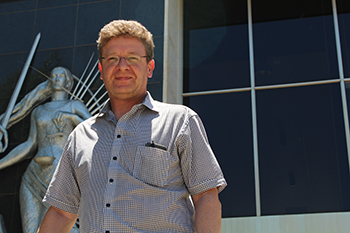Latest News Archive
Please select Category, Year, and then Month to display items
23 April 2020
|
Story Cornelius Hagenmeier
|
Photo Pixabay

The iKudu project, which is an European Union-funded Capacity Building in Higher Education (CBHE) project, has recently launched its blog, which aims to amplify the diverse voices of all iKudu stakeholders. In this space, members of the iKudu team will regularly share their views on the project and related international education topics.
The iKudu project focuses on developing a contextualised South African concept of Internationalisation of the Curriculum (IoC), which integrates Cooperative Online International Learning (COIL) virtual exchanges. The project was launched by the UFS in 2019, together with nine European and South African partner universities. It is funded by the European Union’s Erasmus+ programme with EUR999 881 (approximately R20 million) and is implemented over a three-year period.
The iKudu project is based on the fundamental belief that it is necessary to rethink internationalisation in an uncertain world. First, it is crucial to recognise and transform the power dynamics underlying international academic collaboration. Second, it is essential to develop pedagogies that allow every student to participate in international education, integrating technology where appropriate.
However, while all stakeholders agree on the fundamental tenets of the project and its principal goals, all iKudu stakeholders contribute different perspectives. In the blog, the iKudu stakeholders will provide a space for intellectual discourse on the project and related international education topics, which will allow constructive and critical engagement.
The link to the blog can be found at: https://www.ufs.ac.za/ikudu/ikudu-blogs/Transforming-Curricula-through-Internationalisation-and-Virtual-Exchanges
Freedom of religion, a constitutional right and area of global concern
2017-01-17

Prof Shaun de Freitas
Photo: Mamosa Makaya
Freedom of religion is enshrined in the South African Constitution, states that everyone has the right to freedom of religion, which more specifically entails the freedom of conscience, religion, thought, belief and opinion. It makes provision for the protection of religious communities in South Africa. Consequently, the maintenance and protection of such a right is of fundamental importance.
Prof Shaun de Freitas, Associate Professor of Law at the University of the Free State (UFS) specialises in constitutional law, with a specific focus on the right to freedom of religion, and has produced several publications in the field. The latest is titled “Transcending the Private-Public School Divide in the Context of the Right to Freedom of Religion in South Africa”, Chapter 19, in Religious Freedom and Religious Pluralism in Africa – Prospects and Limitations published by Stellenbosch University in 2016.
Prejudice a challenge in all societies
There are numerous challenges faced by religious groups around the world concerning prejudice, association with terrorism and political power and influence. Therefore, research in this field becomes important in helping to uphold the rights and freedoms of religious minority groups, to be able to foster understanding between communities.
Balancing responsibility and religious rights
His current focus is on challenges that have arisen in South Africa, more specifically pertaining to the right of medical practitioners to object conscientiously towards participating in certain medical procedures, the parameters of freedom related to religious associations and the inclusion of religious expression in public schools. These matters are also relevant to many other parts of the world (including, ironically enough, those democratic societies that endeavour to make diversity flourish).